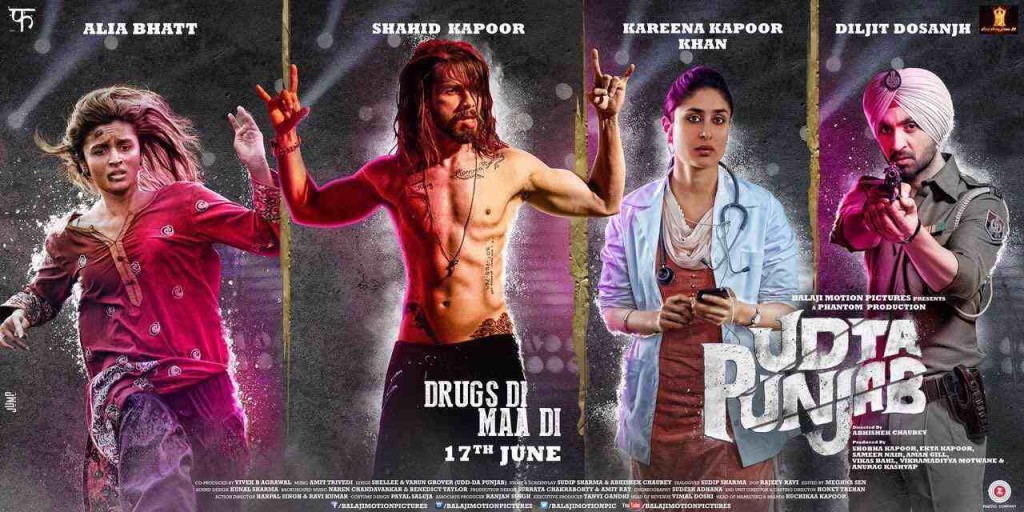Abhishek Chaubey’s Udta Punjab is about depravity and redemption, despair and hope, the omnipotence of venality and the heroism of individuals. Despite its drawbacks, the movie presents the unlovely reality of Punjab in a compelling narrative.
Tommy Singh (Shahid Kapoor) is on a high, both as a rock star and as a drug addict—and he loves it. He glamorizes substance abuse in his songs; there is frenzied dancing, delinquent behavior; he has a huge fan following. He is on the top of the world—till the law catches up with him. Yes, there is law and there are its enforcers, though corrupt to the core. Most of them anyway.
His path crosses with that of a Bihari laborer (Alia Bhatt), who has tried to make a fast buck by taking a plunge into the narcotic trade. She ends up in the hands of local drug dealers, suffers as their sex slave.
Sartaj Singh (Diljit Dosanjh) is a corrupt junior police officer, an assistance sub-inspector, who turns into an anti-narcotic crusader after his own brother becomes a junkie. His brother is admitted to the rehab centre run by Dr. Preet Sahni (Kareena Kapoor Khan). The cop joins hands with her to expose the vile trade.
There are other characters as well—Sartaj’s senior officer, the local drug-lord and his henchmen, the local politician, Tommy’s uncle and mentor (Satish Kaushik).
All main characters, except the good doctor, are morally deviant but not unconscionable; they are corrigible, audaciously corrigible. The actions of the diverse characters create a gripping narrative, though there are certain jerks and unconvincing features. It doesn’t really add up as to why Sartaj was so ignorant about the local trade. For his senior officer, a rotten cop, is also a kind of elder brother to him; Sartaj not knowing about the nitty-gritty of drugs business in his own area is not credible.
Another flaw pertains to Tommy, whose character is said to have been inspired by Yo Yo Honey Singh, has been apportioned much greater blame for the crisis that is justifiable. Watching the movie one gets the feeling that Tommy is hugely, if not solely, responsible for Punjab’s drug problem. The impression one gets is that it is his songs that have corrupted a large section of youth in the state.
Tommy’s metamorphosis from a druggie singer, full of vanity, to a savior of a damsel in distress is rather abrupt; his character hasn’t been properly delineated.
The tempo of the movie is fast, keeping the audience captivated. Music, though, is forgettable, despite the fact that a main character is a singer.
The lingo used has been the subject of much discussion, especially after Pahlaj Nihalani’s prudish paroxysms, but the expletives don’t offend the sensibilities of discerning audience as the reality whence they emanate is much filthier. At any rate, profanities are not employed, as they were in the execrable Gangs of Wasseypur, to demonstrate the filmmaker’s rebelliousness or to glorify crime.
Udta Punjab has not Bollywoodized Punjab with its paajis and chaijis, bhangra and balle-balle; it is real Punjab, with countless drug addicts and a flourishing narcotic trade carried out in connivance with cops and politicians.
The actors have done their part well, though I feel that Shahid ought to have spoken Punjabi with greater flair; he could have learnt a lot from his father, Pankaj, whose grasp of the language is perfect. The guy has done well nonetheless, as also has his ex-girlfriend, Kareena. Again, she could have spoken better Punjabi. Daljit looks very convincing, both as a cop and as a man who slowly falls in love with a woman above his station—his junior police officer versus Kareena’s doctor. It is, however, Aalia who steals the show, despite her discomfort with the Bihari dialect. Hopefully, she would be able to shed her image as the dumbest bimbo.
A big positive is the director’s refusal to indulge in sentimentalism in the movie, though the subject provided him an excellent opportunity to do that—no lectures about the degradation of the land of five rivers, no lamentations intoning the names of Guru Nanak, Bhagat Singh, and Lala Lajpat Rai. One major reason that the film stands apart is that it does not intend to send across any message; it just tells the story. No Aamir Khan-, Munna Bhai-type of entertainment-laced sermons for the society; no adulteration; no pretentiousness; no sanctimony; no concessions to the despicable doctrine that art, like the individual, should exist for the sake of society. Udta Punjab is just art—and art for the sake of art.
Ironically, the complete lack of sermonizing and message-peddling in Udta Punjab has the potential of resulting in some good for the drug-infested state. Such is the power of art, unadulterated art.
